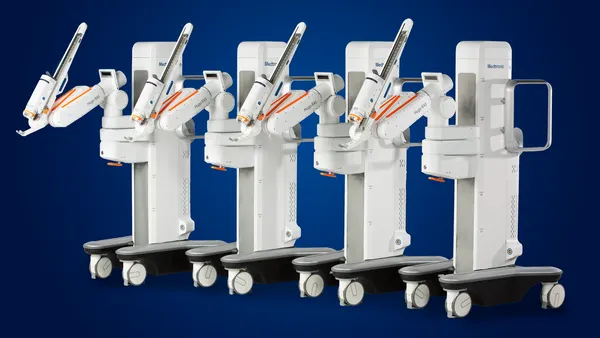Dive Brief:
- The Food and Drug Administration said it plans to begin reclassifying most high-risk in vitro diagnostics to moderate-risk, allowing companies to pursue regulatory clearance for new tests through the less burdensome 510(k) pathway.
- Reclassification of the tests could encourage more manufacturers to develop them, thereby increasing competition and access for patients, Jeff Shuren, director of the agency’s Center for Devices and Radiological Health, said Wednesday in a statement.
- The move comes ahead of the FDA’s plan to finalize a rule to regulate laboratory-developed tests, expected in April, and indicates the agency is “serious” about taking that step, TD Cowen analyst Eric Assaraf said in a note to clients Monday.
Dive Insight:
In reclassifying most IVDs from class III, the most stringent type of medical device review, to class II, the FDA stressed it would still be conducting a pre-market review of the tests under the 510(k) pathway.
Most of the tests that will be reclassified are infectious disease and companion diagnostics, which provide information for use with a corresponding drug, the agency said.
As it works to shift the test classifications, the FDA is moving forward with its plan to increase oversight of laboratory-developed tests, over the objections of industry groups including the American Clinical Laboratory Association and American Hospital Association.
Lab-developed tests are designed and used within a single laboratory. The FDA maintains that the risks associated with lab-developed tests have increased since the agency adopted an enforcement-discretion approach to regulating them decades ago.
Last week, FDA Commissioner Robert Califf said finalizing the rule to expand oversight of lab-developed tests is one of the agency’s top priorities.
Most clinical labs currently bypass the FDA altogether by launching their tests as lab-developed tests, Assaraf wrote, noting that the FDA has long maintained it has the authority to regulate the tests.
Former FDA Commissioner Scott Gottlieb, speaking at an event last week, said FDA's plan to loosen its diagnostics classifications should reduce the financial burden on test makers and help get the final rule on lab-developed tests “across the finish line,” Assaraf said.
“Whether or not FDA moves forward with its rule-making, we think Congress will need to step in at some point to give FDA explicit authority to regulate LDTs,” the analyst wrote.
The FDA said that in addition to the reclassification process, it would continue to take a risk-based approach in the initial classification of individual IVDs to determine the appropriate level of regulatory controls and whether a new test may be classified into class II through the de novo pathway, with special controls established. That approach would be an alternative to classifying a test as class III and subject to the pre-market approval pathway.
“Based on our experience, we believe that special controls could be developed, along with general controls, that could provide a reasonable assurance of safety and effectiveness for most future companion diagnostic and infectious disease IVDs. As such they would be regulated as class II devices,” the FDA said.










